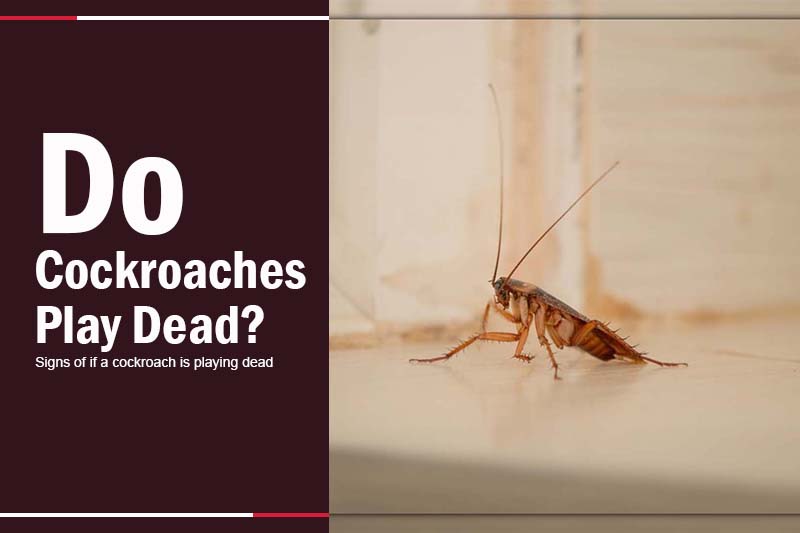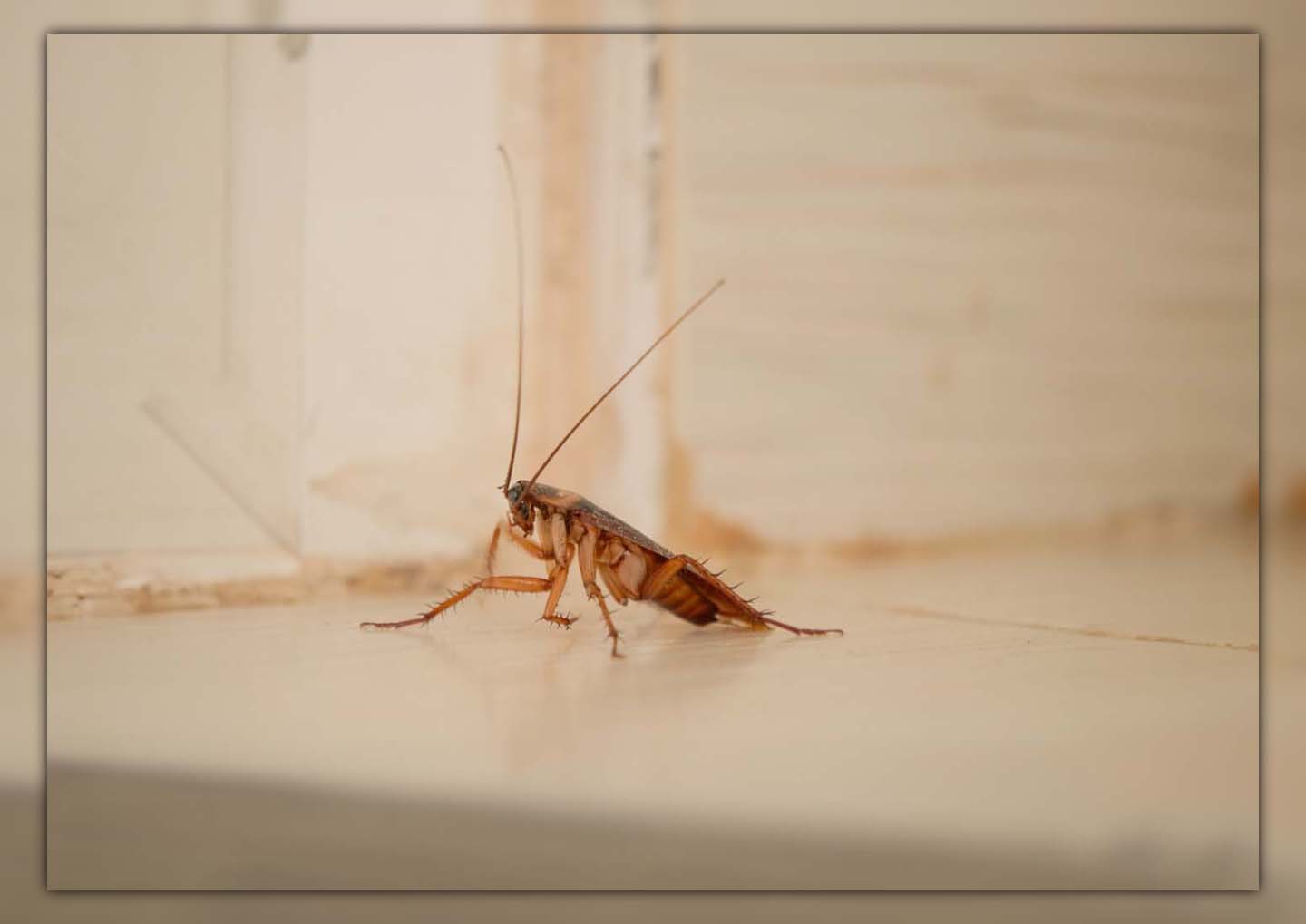Do you want to know if cockroaches can play dead and how they do it?
If you answered yes, then you need to read this blog about cockroaches play dead.

Why do Cockroaches play dead?
Animals have a physical response when they face danger, which helps them to survive. They can either run away or fight back, depending on the situation. But roaches are small and weak, and they cannot escape or defend themselves from most of their enemies. So they have a different way to protect themselves, which is to pretend to be dead. They just stay motionless until the danger is gone and then continue with their normal activities.
You may be curious about how these roaches can stop breathing for so long. Here are some possible explanations.
Roaches need oxygen to live, but too much oxygen can harm their bodies. This is also true for humans; we can get lung damage from breathing too much oxygen. It is suggested that roaches stop breathing to avoid high oxygen levels from time to time. And this has made them good at holding their breath for long periods.
By holding their breath, roaches can save water. It is known that many insects stop breathing when they rest. But it was only recently that studies on roaches showed why. Roaches do not have lungs, but they have a very efficient way to breathe. Air enters their body through openings called spiracles and then goes directly to the cells through tubes called trachea.
When roaches are in an environment that makes them lose a lot of water as a natural reaction, they will stop breathing to reduce water loss. This has made them good at holding their breath.
When roaches hold breath, they build up carbon dioxide in their body, which makes it easy to get rid of. And by doing that, they have become good at holding their breath for long.
>> Read more: Finding dead roaches in house: Why Only Corpses in Your Home?
Difference between a dead cockroach and a playing one
For you to avoid being tricked by those smart bugs, you need to be observant and look at the physical behaviors. This will help you in knowing weather a roach is really dead or just messing around with your intelligence.
Here is a check list that to help you with this:
Antennae movements
A dead cockroach will not be able to move its antennae around because it does not have the ability to sense anymore. While acting dead, roaches will move their antennae from time to time while trying to figure out if the potential danger is gone.
The roach’s antennae is designed to detect vibrations and smell. This helps it to know when to get up and run after playing dead for some time. If you are keen, it will move its antennae after every 3-5 minutes. It does not need to look at you because those sensitive detectors are enough for the job.
Legs position
In most cases, roaches that are acting dead will have their legs positioned in a way that is ready for action. Those will look like they are spread from the body in a way that can easily grab on something. If you pull its legs, they will go back to the same position with a rigid feeling on them.
A dead roach will on the other hand will have folded legs that are life less and you can tell from how relaxed they are resting against its body. Even if you pool them apart, there will be no resistance as compared to the ones that are playing dead.
Odor
A dead roach will produce an acidic odor as it starts to decompose. If they are dead in large numbers, there may be a musty smell that lingers around the area. The odor is usually picked when a group of them is dead and you need to be very close to pick up the smell from a single one.
A live roach that is only staging its death will have no odor. Even from the look, you can tell that it is not withered like a dead one. Even if they are gathered at one point, there may be an odor but it will not be as strong when compared to the type produced from those that are dead.
Unlike roaches in fridge, those in a microwave will produce a bad smell when the machine is being used for more than 30 minutes at a go. The heat will start roasting their droppings which will produce a foul odor.
Numbers
It is almost impossible for 3 or more cockroaches to play dead all at once. There will be erratic movements since all of them will not coordinate and stick to the plan at the same time. Some will try to flee while others will fidget and move around.
On the other hand, a colony of dead roaches will remain still without any movements even if they are disturbed. They will stay put as long as they are not moved in any way.
>> Read more: Why Are Cockroaches Upside Down When They Die?
How to know if a Cockroach is playing dead?
It can be hard to tell if a cockroach is really dead or just pretending to be dead as a way to survive. Here are some clues that might help you figure out the difference:
- Movement: Cockroaches that are playing dead will be very still and not react to anything, even if you touch them lightly.
- Posture: A cockroach that’s playing dead might often be seen lying on its back or its side, which is not how it usually stands or walks when alive.
- Antennae and Legs: When a cockroach is dead, its antennae and legs might be floppy and loose. But when a cockroach is playing dead, it might still have some stiffness in its limbs, and they might move slightly when touched.
- Time: Playing dead is usually short-lived. If the cockroach stays in the same position for a long time, it’s more likely that it’s dead.
- Situation: Think about the context. If the cockroach was moving around and suddenly stopped, it might be more likely to be playing dead. If the cockroach has been in the same spot for a long time, it could be dead.
- Behavior Change: If you watch the cockroach for a while and see it suddenly start moving or acting again after being still, it’s likely that it was playing dead.
- Physical Check: If you don’t mind handling cockroaches, you can gently poke or push the cockroach to see if it responds to the stimulus. If it suddenly starts running or twitching, it is likely playing dead.
Keep in mind that playing dead can vary in how long and how well it works for different cockroaches. If you’re not sure if a cockroach is alive or playing dead, you can wait and see if it eventually moves by itself.
If it remains still for a long time or shows no signs of life after checking, it’s more likely to be dead.
>> Read more: Death’s head roach: Nature’s Mysterious Marvel Revealed.
Why roaches lie on their backs when playing dead?
A cockroach’s weight is concentrated at the top and this is supported by thin legs. It will topple and die on its backs if the legs become weak. When acting dead, roaches will fold their legs and lie on their backs.
They have strong legs that support them but when they are intoxicated or starved, those legs cannot bear their weights. However, this does not mean that cockroaches have to flip over when faking their death. They can simply choose to remain dormant and wait to see if something will approach them.
Insecticides are made of neurotoxins that cause convulsions. When those chemicals are sprayed on roaches, those chemicals paralyze the muscles that support their legs causing them to turn and die on their backs.
Insecticides that contain toxins like pyrethroids and organophosphate cause stimulation. Bugs cannot handle those simulations and those will cause reflexes on their legs. As the legs become stiff and straight, they will fall on their backs because they are heavy at the top.
Can dead roaches come back to life?
According to some sources, dead roaches cannot come back to life, but they can play dead convincingly. If exposed to deadly circumstances, roaches may go into shock and remain immobile until they can move again.
If you think you’ve killed a cockroach, but it begins to move a short time after, it was never really dead in the first place. Instead, the roach might’ve held perfectly still to avoid attracting predators.
Conclusion
You have just learned the truth about cockroaches play dead. Cockroaches can play dead convincingly, but they cannot come back to life once they are truly dead. They play dead to avoid predators, to recover from shock, or to survive extreme conditions.
If you want to learn more about cockroaches and how to deal with them, you can check out our other blogs from Pestweek.

Calina Mabel has over 15 years of experience in the field of journalism and communications. Currently, Calina Mabel is the Content Writer for categories such as Cockroach, Ants, Bed Bugs, Mosquito, Rodent, Termite, and Flies on Pestweek.com. She aims to build content for these categories with a focus on providing valuable and accessible information to readers, in order to create the world’s largest knowledge community about Pests.
All content written by Calina Mabel has been reviewed by Emily Carter.


